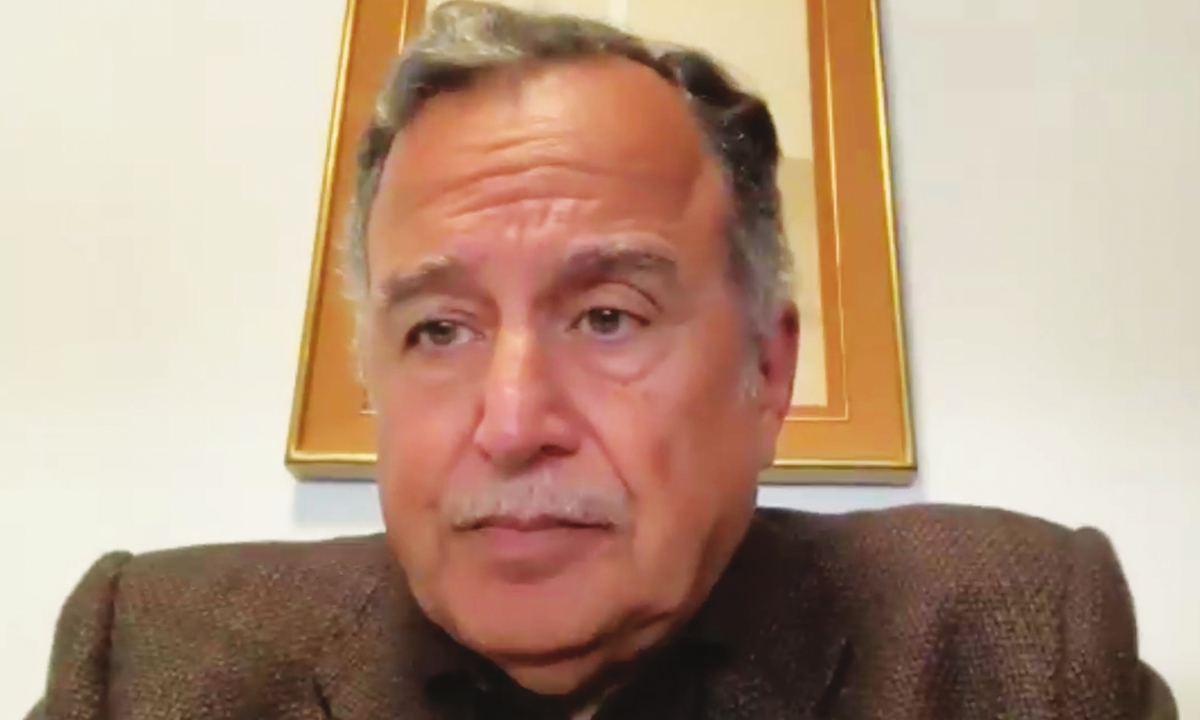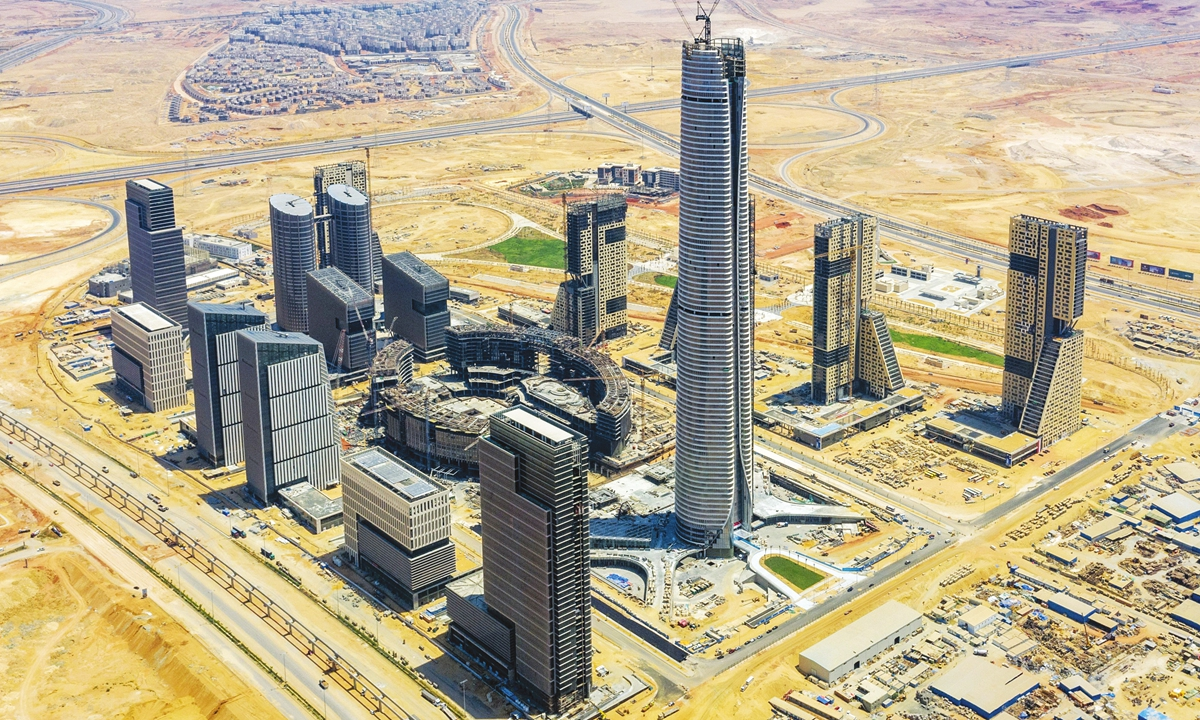Nabil Fahmy: Chinese approaches focus on shared interests, mutual respect and solutions
Mar 06, 2023
Aerial photo taken on July 19, 2022 shows the Central Business District project in Egypt's new administrative capital, which was constructed by China State Construction Engineering Corporation, in Cairo, Egypt. Photo: Xinhua
Editor's Note:
The two sessions, one of China's most important annual political events, is an important window for the outside world to understand China's development achievements, plans, governance philosophy, diplomatic concepts and global initiatives. Through this window, international observers closely watch China's moves and recognize China's development.
Commenting on the Global Development Initiative and Global Security Initiative advocated by China, Nabil Fahmy (Fahmy), former foreign minister of Egypt and visiting senior fellow at the Institute for Global Cooperation and Understanding at Peking University, told Global Times (GT) reporter Liu Zixuan that what's interesting in the Chinese approach, be that in the development or security component, is the focus on shared interests, mutual respect, and the focus on comprehensive, sustained solutions.
This is the second interview of the series over the two sessions.
GT: According to a government work report submitted Sunday to the national legislature for deliberation,major-country diplomacy with Chinese characteristics has been conducted on all fronts over the past five years. How do you understand "major country diplomacy with Chinese characteristics?"
Fahmy: It goes without saying that since World War II, the Soviet Union and the US, the two major powers, had competed with each other. Then, China emerged and became a much more prominent global player, first economically and then with more political energy as well, which raised eyebrows and some concerns from the West.
There were concerns, particularly in the West, but China will play an increasing role. The first was that it joined the UN Security Council. I think China's interest in playing a role is legitimate. And as long as the major powers all respect international law, there is no legitimate reason for them to be concerned about China.
I would also argue that historical precedent has shown us that political interests naturally follow economic interests. That's what happened to the old European countries, as well as exactly what happened to modern Western countries. So it's not surprising that as China develops, it would also want to engage more politically. That's not the issue. The issue is that we must pursue a collective interest and a win-win strategy rather than a zero-sum game.
GT: What do the Global Development Initiative and Global Security Initiative advocated by China reflect China's diplomatic philosophy?
Fahmy: The more energetic China becomes, the more the existing major powers will be concerned. But that is not a reason for China not to be energetic. I think what's interesting in the Chinese approach, be that in the development or security component, is the focus on shared interests, the focus on mutual respect, and the focus on comprehensive, sustained solutions. These are concepts that are very consistent with and adopted by countries like mine and by the non-aligned and developing world.
But it is important for China to talk a little bit more about these initiatives, explain them in more details, and do so in different regional environments that allow for a constructive response to concerns raised by others and allow for a better contextual explanation of how one can better cooperate with China in these areas without being afraid that it is just another major power dealing with different parts of the world.
GT: What are your expectations for China's diplomacy after the 20th National Congress of the CPC?
Fahmy: It's clear from following China over the last decade or so that China is becoming more vocal, more assertive, and more global in its perspectives. China is becoming more global because it understands that it can only achieve its goals as part of the larger global community. Therefore, it speaks out on these issues. Also, it is becoming more assertive. The Chinese solution is something that has raised eyebrows because it is new.
I think the significant contributions made by China in support of particular infrastructure projects, even many projects before the Belt and Road Initiative, are much appreciated in the developing world. These are good starting points, and they are a natural consequence of the development in China. China needs to be very vocal and very engaged in explaining this. You cannot have a passive diplomatic approach. If you have major projects and want to play a global role, you must be more vocal.

Nabil Fahmy Photo: interview screenshot
GT: In President Xi Jinping's diplomatic philosophy, a human community with a shared future is a very important concept. In your opinion, where does the vitality of this idea come from?
Fahmy: Different communities will adopt different approaches. It's important for me because I'm a strong supporter of the UN and the UN Charter that represents the collective nature of our interests. We are all members of one community. Our interests, therefore, should be of a collective nature, be that in development or security. Development needs to be more equitable and more sustainable. And security needs to be more collective as well.
Recently, we all suffered from the COVID pandemic. Countries around the world reacted differently. Many of the developed countries were very nationalistic in determining who they supported with the vaccines and who they did not support with the vaccines. It was left with the impression that there were double standards. And the concepts of collectiveness and humanity were not being respected enough.
I'm a strong believer in each community choosing its own way of living. Whatever that way is, governments have to be responsive to their communities. That's how these systems work. It is not something that is unresponsive to communities' needs. Different countries need to work together. We need to agree as much as we can on global cooperation standards. That's why we have the UN Charter. That's why we have international agreements.
I would argue that democracy is important in international relations, not only within countries but also between countries. When there were 40, 50, or 60 states in the UN, the developed world, both democratic and non-democratic, was quite content with the UN. When the UN included more than 190 states, reflecting an all-in-touch community, they felt it was cumbersome and difficult to respond to, and they preferred to do business outside the UN. That's not a concept that relates to democratic principles. So one cannot have double standards in doing this.
GT: In the past few years, China-US relations have experienced a severe deterioration. Under the suppression of the US, China's diplomacy has forged a path of its own. What enlightenment do you think this road has for other countries?
Fahmy: Now, China has for generations been pursuing what we call a soft and modest diplomatic path, especially globally, where it has positioned itself as a close friend to the developing world, rather than as a major power with its economic growth. Naturally, it had more needs for markets, and it had more needs for resources. Therefore, frankly, it had more interest in being an engaged partner in the global community. I remember a few years ago when China talked about being ready to embrace a leading role in economic reform at the global level, which was very well received by the economic community. At the same time, it surprised some strategic analysts in the West because they were used to being the ones who defined that alone.
So I find the Chinese shift in policy natural. I've been writing for years that not only is China coming, but China has actually arrived in the international community. People started to believe that there would be political as well as economic engagement by China. So I'm quite happy with this. The only point I would emphasize as a developing country is that we want a more equitable world. We want a world based on the rule of law and a world order that is fundamentally multilateral.
GT: What are your expectations for the establishment of a China-Arab community with a shared future?
Fahmy: First of all, China-Arab engagement has been very impressive, and it's been very open from both sides. At the most recent meeting in Saudi Arabia, where the Chinese president was welcomed in a bilateral visit and also met with Arab leaders, a significant number of Arab leaders committed to projects worth $30 billion over the next few years.
But interestingly enough, it wasn't only infrastructure projects. It was a project encompassing digital security, cyber security, the environment, and new clean energy. So it shows you new openness and a new engagement. Much of the Arab world used to be Western-oriented in terms of markets and the economy. Today, China is one of the largest trading partners with a number of Arab countries in the Gulf, as well as in North Africa, where it has made very significant investments. In many countries, including my own country, Egypt, China will continue to be interested in significant energy resources from the Middle East, as well as significant resources in special minerals in Africa. I'm optimistic about the engagement.
The only point I keep making to my Egyptian friends, my Arab friends and my Chinese friends is that we have excellent relations at government-to-government level. We need to let more people engage, so that when Chinese industries, markets, and firms come to the Arab markets, they understand how to do business in that market and vice versa. We have Egyptian firms investing in Guangzhou in China. They only learned to do business when they actually established themselves in China and dealt with their Chinese counterparts directly. So more people-to-people engagements are important between the Arab world and China. And I look toward to the relationship with optimism.

 Nabil Fahmy Photo: interview screenshot
Nabil Fahmy Photo: interview screenshot